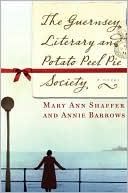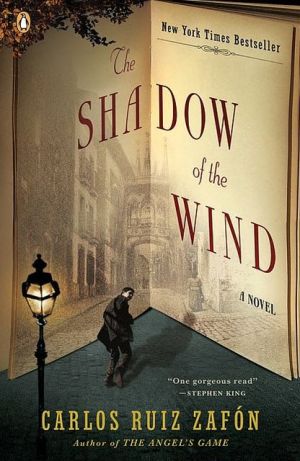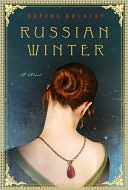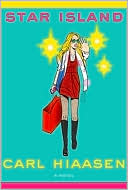Nocturnes: Five Stories of Music and Nightfall
From the award-winning author of Remains of the Day comes an inspired sequence of stories, which is as affecting as it is beautiful.\ \ With the clarity and precision that have become his trademarks, Kazuo Ishiguro interlocks five short pieces of fiction to create a world that resonates with emotion, heartbreak, and humor. Here is a fragile, once famous singer, turning his back on the one thing he loves; a music junky with little else to offer his friends but opinion; a songwriter who...
Search in google:
From the award-winning author of Remains of the Day comes an inspired sequence of stories, which is as affecting as it is beautiful. With the clarity and precision that have become his trademarks, Kazuo Ishiguro interlocks five short pieces of fiction to create a world that resonates with emotion, heartbreak, and humor. Here is a fragile, once famous singer, turning his back on the one thing he loves; a music junky with little else to offer his friends but opinion; a songwriter who inadvertently breaks up a marriage; a jazz musician who thinks the answer to his career lies in changing his physical appearance; and a young cellist whose tutor has devised a remarkable way to foster his talent. For each, music is a central part of their lives and, in one way or another, delivers them to an epiphany.The Barnes & Noble ReviewIf a different writer had published a book with the same title as Kazuo Ishiguro's collection of stories, the reader might be tempted to groan at its preciousness. Nocturnes -- could there be a more self-consciously arty word, with its memories of Schubert and Chopin? And doesn't the subtitle make things worse, insisting too grandly on melody and melancholy? Yet Ishiguro, as readers of his fiction know, is anything but a conventional or pretty writer. In his previous book, Never Let Me Go, he conjured the most convincing dystopia in recent literary fiction: an alternative England where human clones are raised in segregated schools, until their organs are harvested for the benefit of "real" people. That the clones are every bit as real as their originals is less disturbing, in Ishiguro's novel, than the intricate ways they justify and reconcile themselves to their fate. With typical indirection, Ishiguro turned his sci-fi premise into a parable of the ways we learn to live in our own world of injustice and despair.
Crooner\ Chapter 1\ The morning i spotted Tony Gardner sitting among the tourists, spring was just arriving here in Venice. We’d completed our first full week outside in the piazza—a relief, let me tell you, after all those stuffy hours performing from the back of the cafe, getting in the way of customers wanting to use the staircase. There was quite a breeze that morning, and our brand-new marquee was flapping all around us, but we were all feeling a little bit brighter and fresher, and I guess it showed in our music.\ But here I am talking like I’m a regular band member. Actually, I’m one of the “gypsies,” as the other musicians call us, one of the guys who move around the piazza, helping out whichever of the three cafe orchestras needs us. Mostly I play here at the Caffè Lavena, but on a busy afternoon, I might do a set with the Quadri boys, go over to the Florian, then back across the square to the Lavena. I get on fine with them all—and with the waiters too—and in any other city I’d have a regular position by now. But in this place, so obsessed with tradition and the past, everything’s upside down. Anywhere else, being a guitar player would go in a guy’s favour. But here? A guitar! The cafe managers get uneasy. It looks too modern, the tourists won’t like it. Last autumn I got myself a vintage jazz model with an oval sound-hole, the kind of thing Django Reinhardt might have played, so there was no way anyone would mistake me for a rock-and-roller. That made things a little easier, but the cafe managers, they still don’t like it. The truth is, if you’re a guitarist, you can be Joe Pass, they still wouldn’t give you a regular job in this square.\ There’s also, of course, the small matter of my not being Italian, never mind Venetian. It’s the same for that big Czech guy with the alto sax. We’re well liked, we’re needed by the other musicians, but we don’t quite fit the official bill. Just play and keep your mouth shut, that’s what the cafe managers always say. That way the tourists won’t know you’re not Italian. Wear your suit, sunglasses, keep the hair combed back, no one will know the difference, just don’t start talking.\ But I don’t do too bad. All three cafe orchestras, especially when they have to play at the same time from their rival tents, they need a guitar—something soft, solid, but amplified, thumping out the chords from the back. I guess you’re thinking, three bands playing at the same time in the same square, that would sound like a real mess. But the Piazza San Marco’s big enough to take it. A tourist strolling across the square will hear one tune fade out, another fade in, like he’s shifting the dial on a radio. What tourists can’t take too much of is the classical stuff, all these instrumental versions of famous arias. Okay, this is San Marco, they don’t want the latest pop hits. But every few minutes they want something they recognise, maybe an old Julie Andrews number, or the theme from a famous movie. I remember once last summer, going from band to band and playing “The Godfather” nine times in one afternoon.\ Anyway there we were that spring morning, playing in front of a good crowd of tourists, when I saw Tony Gardner, sitting alone with his coffee, almost directly in front of us, maybe six metres back from our marquee. We get famous people in the square all the time, we never make a fuss. At the end of a number, maybe a quiet word will go around the band members. Look, there’s Warren Beatty. Look, it’s Kissinger. That woman, she’s the one who was in the movie about the men who swap their faces. We’re used to it. This is the Piazza San Marco after all. But when I realised it was Tony Gardner sitting there, that was different. I did get excited.\ Tony Gardner had been my mother’s favourite. Back home, back in the communist days, it had been really hard to get records like that, but my mother had pretty much his whole collection. Once when I was a boy, I scratched one of those precious records. The apartment was so cramped, and a boy my age, you just had to move around sometimes, especially during those cold months when you couldn’t go outside. So I was playing this game jumping from our little sofa to the armchair, and one time I misjudged it and hit the record player. The needle went across the record with a zip—this was long before CDs—and my mother came in from the kitchen and began shouting at me. I felt so bad, not just because she was shouting at me, but because I knew it was one of Tony Gardner’s records, and I knew how much it meant to her. And I knew that this one too would now have those popping noises going through it while he crooned those American songs. Years later, when I was working in Warsaw and I got to know about black-market records, I gave my mother replacements of all her worn-out Tony Gardner albums, including that one I scratched. It took me over three years, but I kept getting them, one by one, and each time I went back to see her I’d bring her another.\ So you see why I got so excited when I recognised him, barely six metres away. At first I couldn’t quite believe it, and I might have been a beat late with a chord change. Tony Gardner! What would my dear mother have said if she’d known! For her sake, for the sake of her memory, I had to go and say something to him, never mind if the other musicians laughed and said I was acting like a bell-boy.\ But of course I couldn’t just rush over to him, pushing aside the tables and chairs. There was our set to finish. It was agony, I can tell you, another three, four numbers, and every second I thought he was about to get up and walk off. But he kept sitting there, by himself, staring into his coffee, stirring it like he was really puzzled by what the waiter had brought him. He looked like any other American tourist, dressed in a pale-blue polo shirt and loose grey trousers. His hair, very dark, very shiny on those record covers, was almost white now, but there was still plenty of it, and it was immaculately groomed in the same style he’d had back then. When I’d first spotted him, he’d had his dark glasses in his hand—I doubt if I’d have recognised him otherwise—but as our set went on and I kept watching him, he put them on his face, took them off again, then back on again. He looked preoccupied and it disappointed me to see he wasn’t really listening to our music.\ Then our set was over. I hurried out of the tent without saying anything to the others, made my way to Tony Gardner’s table, then had a moment’s panic not knowing how to start the conversation. I was standing behind him, but some sixth sense made him turn and look up at me—I guess it was all those years of having fans come up to him— and next thing I was introducing myself, explaining how much I admired him, how I was in the band he’d just been listening to, how my mother had been such a fan, all in one big rush. He listened with a grave expression, nodding every few seconds like he was my doctor. I kept talking and all he said every now and then was: “Is that so?” After a while I thought it was time to leave and I’d started to move away when he said:\ “So you come from one of those communist countries. That must have been tough.”\ “That’s all in the past.” I did a cheerful shrug. “We’re a free country now. A democracy.”\ “That’s good to hear. And that was your crew playing for us just now. Sit down. You want some coffee?”\ I told him I didn’t want to impose, but there was now something gently insistent about Mr. Gardner. “No, no, sit down. Your mother liked my records, you were saying.”\ So I sat down and told him some more. About my mother, our apartment, the black-market records. And though I couldn’t remember what the albums were called, I started describing the pictures on their sleeves the way I remembered them, and each time I did this, he’d put his finger up in the air and say something like: “Oh, that would be Inimitable. The Inimitable Tony Gardner.” I think we were both really enjoying this game, but then I noticed Mr. Gardner’s gaze move off me, and I turned just in time to see a woman coming up to our table.\ She was one of those American ladies who are so classy, with great hair, clothes and figure, you don’t realise they’re not so young until you see them up close. Far away, I might have mistaken her for a model out of those glossy fashion magazines. But when she sat down next to Mr. Gardner and pushed her dark glasses onto her forehead, I realised she must be at least fifty, maybe more. Mr. Gardner said to me: “This is Lindy, my wife.”\ Mrs. Gardner flashed me a smile that was kind of forced, then said to her husband: “So who’s this? You’ve made yourself a friend.”\ “That’s right, honey. I was having a good time talking here with . . . I’m sorry, friend, I don’t know your name.”\ “Jan,” I said quickly. “But friends call me Janeck.”\ Lindy Gardner said: “You mean your nickname’s longer than your real name? How does that work?”\ “Don’t be rude to the man, honey.”\ “I’m not being rude.”\ “Don’t make fun of the man’s name, honey. That’s a good girl.”\ Lindy Gardner turned to me with a helpless sort of expression. “You know what he’s talking about? Did I insult you?”\ “No, no,” I said, “not at all, Mrs. Gardner.”\ “He’s always telling me I’m rude to the public. But I’m not rude. Was I rude to you just now?” Then to Mr. Gardner: “I speak to the public in a natural way, sweetie. It’s my way. I’m never rude.”\ “Okay, honey,” Mr. Gardner said, “let’s not make a big thing of it. Anyhow, this man here, he’s not the public.”\ “Oh, he’s not? Then what is he? A long-lost nephew?”\ “Be nice, honey. This man, he’s a colleague. A musician, a pro. He’s just been entertaining us all.” He gestured towards our marquee.\ “Oh right!” Lindy Gardner turned to me again. “You were playing up there just now? Well, that was pretty. You were on the accordion, right? Real pretty!”\ “Thank you very much. Actually, I’m the guitarist.”\ “Guitarist? You’re kidding me. I was watching you only a minute ago. Sitting right there, next to the double bass man, playing so beautifully on your accordion.”\ “Pardon me, that was in fact Carlo on the accordion. The big bald guy . . .”\ “Are you sure? You’re not kidding me?”\ “Honey, I’ve told you. Don’t be rude to the man.”\ He hadn’t shouted exactly, but his voice was suddenly hard and angry, and now there was a strange silence. Then Mr. Gardner himself broke it, saying gently:\ “I’m sorry, honey. I didn’t mean to snap at you.”\ He reached out a hand and grasped one of hers. I’d kind of expected her to shake him off, but instead, she moved in her chair so she was closer to him, and put her free hand over their clasped pair. They sat there like that for a few seconds, Mr. Gardner, his head bowed, his wife gazing emptily past his shoulder, across the square towards the Basilica, though her eyes didn’t seem to be seeing anything. For those few moments it was like they’d forgotten not just me sitting with them, but all the people in the piazza. Then she said, almost in a whisper:\ “That’s okay, sweetie. It was my fault. Getting you all upset.”\ They went on sitting like that a little longer, their hands locked. Then she sighed, let go of Mr. Gardner and looked at me. She’d looked at me before, but this time it was different. This time I could feel her charm. It was like she had this dial, going zero to ten, and with me, at that moment, she’d decided to turn it to six or seven, but I could feel it really strong, and if she’d asked some favour of me—if say she’d asked me to go across the square and buy her some flowers— I’d have done it happily.\ “Janeck,” she said. “That’s your name, right? I’m sorry, Janeck. Tony’s right. I’d no business speaking to you the way I did.”\ “Mrs. Gardner, really, please don’t worry . . .”\ “And I disturbed the two of you talking. Musicians’ talk, I bet. You know what? I’m gonna leave the two of you to get on with it.”\ “No reason to go, honey,” Mr. Gardner said.\ “Oh yes there is, sweetie. I’m absolutely yearning to go look in that Prada store. I only came over just now to tell you I’d be longer than I said.”\ “Okay, honey.” Tony Gardner straightened for the first time and took a deep breath. “So long as you’re sure you’re happy doing that.”\ “I’m gonna have a fantastic time in that store. So you two fellas, you have yourselves a good talk.” She got to her feet and touched me on the shoulder. “You take care, Janeck.”\ We watched her walk away, then Mr. Gardner asked me a few things about being a musician in Venice, and about the Quadri orchestra in particular, who’d started playing just at that moment. He didn’t seem to listen so carefully to my answers and I was about to excuse myself and leave, when he said suddenly:\ “There’s something I want to put to you, friend. Let me tell you what’s on my mind and you can turn me down if that’s what you want.” He leaned forward and lowered his voice. “Can I tell you something? The first time Lindy and I came here to Venice, it was our honeymoon. Twenty-seven years ago. And for all our happy memories of this place, we’d never been back, not together anyway. So when we were planning this trip, this special trip of ours, we said to ourselves we’ve got to spend a few days in Venice.”\ “It’s your anniversary, Mr. Gardner?”\ “Anniversary?” He looked startled.\ “I’m sorry,” I said. “I just thought, because you said this was your special trip.”
Crooner Come Rain or Come Shine Malvern Hills Nocturne Cellists
\ From Barnes & NobleEach of these five interconnected "stories of music and nightfall" by the author of The Remains of the Day is told in the first person, and each narrative places music and its players in a new light: One man's impeccable taste in music is the only thing his friends value in him…. A young cellist becomes the instrument of his tutor…. A talented jazz musician, struggling to be recognized, decides that only plastic surgery can save him…. A songwriter blunders into the bankrupt marriage of a couple he barely know… A singer contemplating a comeback makes an irrevocable sacrifice… Literary nocturnes with the clarity of music.\ \ \ \ \ Publishers WeeklyThis suite of five stories hits all of Ishiguro's signature notes, but the shorter form mutes their impact. In “Crooner,” Tony Gardner, a washed-up American singer, goes sloshing through the canals of Venice to serenade his trophy wife, Lindy. The narrator, Jan, is a hired guitar player whose mother was a huge fan of Tony, but Jan's experience playing for Tony fractures his romantic ideals. Lindy returns in the title story, which finds her in a luxury hotel reserved for celebrity patients recovering from cosmetic surgery. The narrator this time is Steve, a saxophonist who could never get a break because of his “loser ugly” looks. Lindy idly strikes up a friendship with Steve as they wait for their bandages to come off and their new lives to begin. In the final story, “Cellists,” an unnamed saxophonist narrator who, like Jan, plays in Venice's San Marco square, observes the evolving relationship of a Hungarian cello prodigy after he meets an American woman. The stories are superbly crafted, though they lack the gravity of Ishiguro's longer works (Never Let Me Go; Remains of the Day), which may leave readers anticipating a crescendo that never hits. (Sept.)\ \ \ Library JournalIn Venice, an old-time singer drafts a guitar player from one of the piazza's bands to accompany him as he serenades the wife he is about to leave. She later turns up in the tale of a sax player whose own wife, having left him, offers to pay for plastic surgery that could help his career. A man who once shared a love for show tunes with an old friend is asked by her husband to act the fool to help save their marriage. A self-centered songwriter breeds disruption while working at his sister's inn, and an inspiring cellist encounters a most unusual teacher. Despite what one might expect from the title, these aren't stories about music, which is simply enfolded in the characters' lives; the music doesn't so much inspire the action as frame it. The writing is lighter and more loose-limbed than one might expect of the author of Never Let Me Go, but it delivers the same scary insights into human misbehavior. VERDICT Once again Ishiguro does something different; recommended for anyone who loves thoughtful writing. [See Prepub Alert, LJ 5/1/09.]—Barbara Hoffert, Library Journal\ \ \ \ \ Kirkus ReviewsA collection of five stylish stories from Ishiguro (Never Let Me Go, 2005, etc.). As indicated by both the title and subtitle, all the stories in this fictional equivalent of a concept album concern musicians and the evening. But even more holds them together. All are first-person narratives (four of them by musicians) and most have a recurring motif of exchanging early promise for something-a marriage, a career, maybe both-that one settles for, once the daylight of youth has given way to the twilight of middle age. When one underachiever remarks "I'm only forty-seven," the woman on whom he had a college crush, now married to his best friend, replies, "Only forty-seven. This ‘only,' this is what's destroying your life. Only, only, only. Only doing my best." That story, "Come Rain or Come Shine," is the most audacious in terms of tone, a very funny narrative, almost emotionally slapstick, about a very sad marriage. The writing is so exquisite throughout that the reader forgives the fact that at least two of these stories don't make much literal sense. In "Malvern Hills," an otherwise subtle story about a young guitarist who believes he has a career in music, and two married couples who have become resigned to their fates, the narrator keeps auditioning for electric bands with an acoustic guitar. The title story, the longest and strangest, concerns a session saxophonist who has somehow been persuaded to have plastic surgery on his face as a big career move. (Who really cares what a session or jazz musician looks like?) But even though there are a few false notes, the tonal command sustains perfect pitch. Like sophisticated literary mood music, this book lingers in the memory, ringing truein theme and metaphor even when lacking plausibility. First printing of 75,000\ \ \ \ \ The Barnes & Noble ReviewIf a different writer had published a book with the same title as Kazuo Ishiguro's collection of stories, the reader might be tempted to groan at its preciousness. Nocturnes -- could there be a more self-consciously arty word, with its memories of Schubert and Chopin? And doesn't the subtitle make things worse, insisting too grandly on melody and melancholy? Yet Ishiguro, as readers of his fiction know, is anything but a conventional or pretty writer. In his previous book, Never Let Me Go, he conjured the most convincing dystopia in recent literary fiction: an alternative England where human clones are raised in segregated schools, until their organs are harvested for the benefit of "real" people. That the clones are every bit as real as their originals is less disturbing, in Ishiguro's novel, than the intricate ways they justify and reconcile themselves to their fate. With typical indirection, Ishiguro turned his sci-fi premise into a parable of the ways we learn to live in our own world of injustice and despair.\ It all seems a long way from music and nightfall. But it doesn't take very long for the reader to discover that, in Nocturnes, Ishiguro is conducting a different kind of writerly experiment, whose design is just as stringent as that in his previous book. It is as though Ishiguro had laid down a group of thematic and stylistic ground rules, and challenged himself to write five stories that obey them in utterly different ways. All the stories, as the subtitle promises, involve music and musicians, and all reach their climax at evening. What is more significant, however, is what the title does not announce: that each story is told in the first person, and deals with the problems in a marriage, with professional success and failure, and with the mysteries of teaching and apprenticeship. Finally, and most surprising of all, Ishiguro gives every story a moment of broad comedy, verging at times on slapstick.\ Part of the pleasure of reading Nocturnes is discovering just how consistently Ishiguro returns to these seemingly inconsistent elements. "Crooner," the first tale in the book, offers the theme on which Ishiguro goes on to build his variations. The narrator, whose name we eventually learn is Jan, is a guitar player in a café band in Venice, who is surprised to notice one day that a famous American singer, Tony Gardner, is sitting in the audience. Jan tells us how important Gardner is to him: growing up in an unnamed Communist country, Gardner's records were hard to find, and his mother treasured her copies. Jan remembers the time when, as a child, he accidentally scratched one of those records: "I felt so bad, not just because she was shouting at me, but because I knew it was one of Tony Gardner's records, and I knew how much it meant to her."\ To the star-struck Jan, then, Gardner is a legend, and he shyly starts a conversation with his idol. But in a way that is characteristic of Ishiguro, the reader begins to see things that the narrator cannot. Gardner, though truly famous in his day, is no longer the red-hot celebrity Jan remembers; people no longer turn to look at him. Perhaps as a result, he is distracted and bemused, and his conversation with his younger wife, Lindy, is tense, trying too hard to seem loving. When Gardner suddenly hires Jan to accompany him that night on a gondola serenade, where he will sing his old love songs at Lindy's window, we begin to suspect that we know what is really going on: the aging star is losing his wife's affections, and this is his theatrical attempt to win her back.\ But as always, Ishiguro is several steps ahead of us. When Jan joins Gardner that night, the singer pours out the real history of their relationship, as the gondolier circles the canals again and again. Lindy, Gardner reveals, was a professional gold-digger. At 19, she started working at a diner near Los Angeles that was frequented by starlets and presided over by Meg, a middle-aged waitress who knew all the Hollywood tricks. "You've got to understand," Gardner says, "these were serious girls, really ambitious, determined girls. Did they talk about clothes and shoes and make-up like other girls? Sure they did. But they only talked about which clothes and shoes and make-up would help them marry a star." Eventually, Lindy married a minor singer, whom she ruthlessly traded in for Gardner, a much bigger prize.\ But this ugly revelation is not the last, or the ugliest, in the story. Jan learns that, as he suspected, this trip to Venice is the last for Tony and Lindy Gardner; after 27 years of marriage, they are about to get divorced. But it is not because Lindy wants to upgrade husbands again. Despite the sordid beginning of their marriage, Gardner confides, they now truly love one another. No, it is Tony who is getting rid of his wife, because he is desperate to make a comeback, and he thinks he needs a younger woman to make him seem relevant. "Look at the ones from my generation still hanging round. Every single one of them, they've remarried," he tells Jan. "Me and Lindy are getting to be a laughing stock."\ "Crooner" covers a surprising amount of emotional ground, though it is only about 30 pages long. We start out in a picture-postcard scene -- Venice, gondolas, serenades -- and end up in the fearsomely realistic world of modern celebrity, where anything and anyone can be sacrificed to the goal of success. At first, the story that follows, "Come Rain or Come Shine," seems to have little in common with "Crooner": now the narrator is a middle-aged expatriate Englishman, Raymond, who has returned to London to visit old college friends, Charlie and Emily. Raymond's life has been aimless, a failure, while Charlie is a successful businessman who married Emily, the girl Raymond liked. All Raymond has now is memories of the way he and Emily used to bond over their love of American songs, the Gershwins and Cole Porter.\ As the story unfolds, however, the reader begins to realize that, once again, Ishiguro has deployed the same elements. Raymond and Charlie are the mediocrity and the success, like Jan and Tony Gardner; once again, the successful man turns out to have a deeply troubled marriage, and needs the unsuccessful one to help him; once again music, now recorded instead of performed, is the medium of seduction. But this time, the story is not bittersweet but an outright farce. Suffice it to say that it climaxes with Emily discovering Raymond in her living room, on all fours, chewing the furniture like a dog, while making soup from an old boot in the kitchen. And yet the bittersweetness, the sense that happiness is the price we must pay for achievement, is there too. It is as if Ishiguro has turned the dial on the kaleidoscope, creating a new pattern out of the old one.\ That he goes on to do this three more times raises Nocturnes from a mere trick to a real demonstration of virtuosity. In the later stories, Ishiguro's protagonists are a sullen teenage songwriter in the English countryside, a jazz session-man recovering from plastic surgery in Beverly Hills, and finally a great cello teacher who may or may not actually know how to play the cello. Music and nightfall come into play each time, but so do the deeper themes Ishiguro, a writer at the height of his fame and skill, seems to know so well: the human cost of success, the illusory nature of accomplishment, and the competition in every heart between vanity and love. --Adam Kirsch\ Adam Kirsch is a senior editor at The New Republic and a columnist for Nextbook.org.\ \ \








